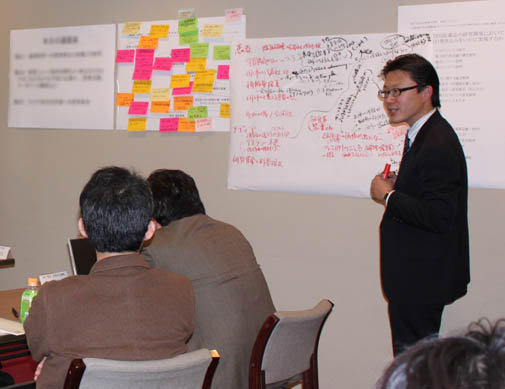Consensus Building and Negotiation:
Research and Practice

I have been engaged in a range of action-oriented research projects aimed at introducing consensus-building and other consensus-seeking processes into policymaking.
Although the term consensus building encompasses multiple meanings, such participatory approaches have been widely employed in urban, regional, and environmental planning practice, particularly in North America. In recent years, similar planning and dialogue-based processes have been implemented in Europe, the Middle East, Asia, and South America. At the same time, the scope of application has expanded to include science and technology policy and welfare policy, especially in the United States.
Since the early 2000s, I have promoted stakeholder-based approaches to policymaking in Japan, initially as a private consultant and subsequently as an academic researcher. In 2005, I participated in the design and implementation of a full-scale consensus-building process in Tokushima, Japan, addressing highway improvement issues. After returning to Tokyo in 2007, I have been involved in numerous dialogue processes both as a practitioner-expert and as a researcher, while also conducting research on the institutional and sociocultural conditions that shape the implementation of participatory governance.
Through reflection on my practice, a central concern has been the adaptation of consensus-building approaches to local contexts. Because these approaches were originally developed in North America, their direct application in Japan can be constrained by differences in social norms, political culture, and institutional arrangements. Accordingly, my doctoral dissertation at MIT, Localizing Public Dispute Resolution in Japan, examined how such approaches can be effectively adapted to Japan’s specific context.
In addition to teaching negotiation theory, which provides the conceptual foundation for consensus-building processes, I also conduct collaborative research on negotiation practices in Japanese and broader Asian contexts with colleagues around the world.
Publications
- M. Matsuura and T. Schenk (eds.) Joint Fact-Finding in Urban Planning and Environmental Disputes, Routledge, 2016.
- M. Matsuura and K. Baba, "Consensus Building for Long-term Sustainability in the Non-North American Context: Reflecting on a Stakeholder Process in Japan" Negotiation and Conflict Management Research, 9(3), pp. 256–268, 2016.
- M. Matsuura, B. Fuller, S. Kaufman, D-Y Kim & K. Baba, "Beyond Negotiation 2.0: Teaching negotiation in the multi-stakeholder, multi-level, and multi-processes world of public policy" In Honeyman, Coben and Lee (eds.) Educating Negotiators for a Connected World, 2013.
- J. Forester, L. Susskind, K. Umemoto, M. Matsuura, G. Paba, C. Perrone and R. Mantysalo, "Learning from Practice in the Face of Conflict and Integrating Technical Expertise with Participatory Planning," Planning Theory and Practice, 12(2), pp. 287-310, 2011.
- M. Matsuura, Jissen-ko-sho-gaku (in Japanese) , 2010.
- Consensus Building Nyu-mon (Japanese translation of "Breaking Robert's Rules by L. Susskind and J. Cruikshank), 2008.
- M. Matsuura and H. Yamanaka, "Planning through Assisted Negotiation: Consensus Building for Traffic Safety," Journal of the Eastern Asia Society for Transportation Studies, 7, pp. 1546-1558, 2007.
-
H. Movius, M. Matsuura, D-Y Kim and J. Yan, "Tailoring the Mutual Gains Approach For Negotiations with Partners in Japan, China, and Korea," Negotiation Journal, 22(4). pp. 389-435, 2006.
